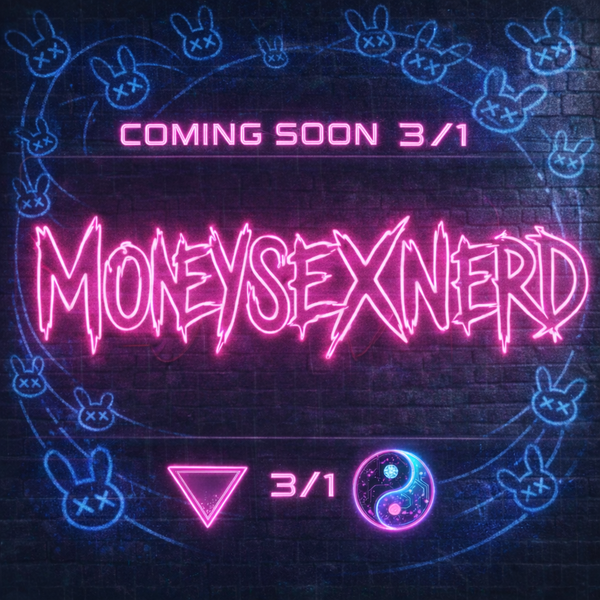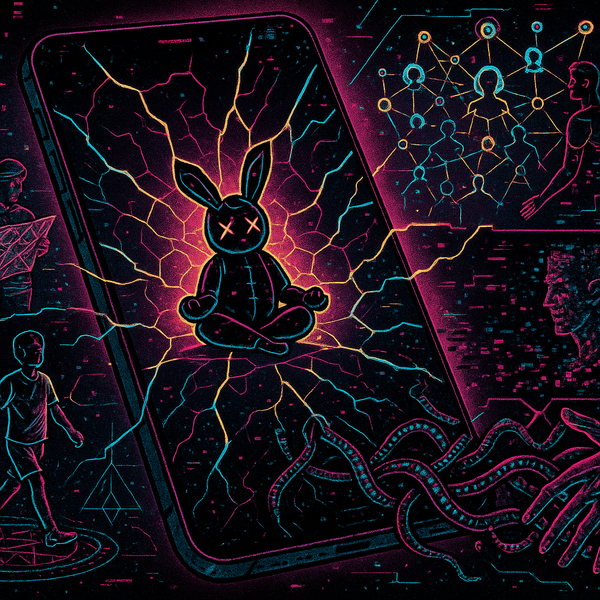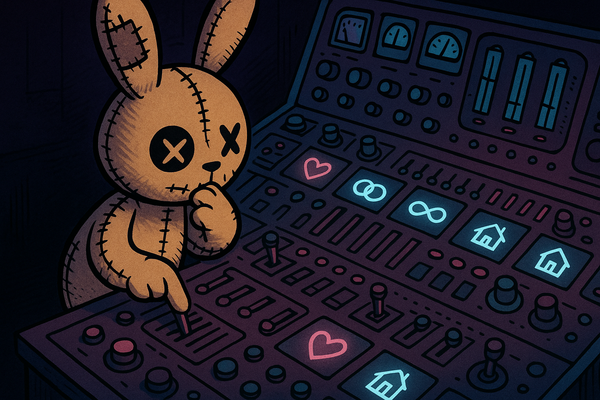The Half-Dosed Redpill Fantasy
True transformation requires complete commitment and irreversible consequences. If you still have a way home to your old life, you didn't take the red pill.

"Cause ain't no such things as halfway crooks. Scared to death, scared to look, they shook."
— Mobb Deep, Shook Ones Pt II
Released in 1999, The Matrix (directed by the Wachowskis) is remembered as one of the defining films of its era.1 Critics have long agreed it functions as a spiritual parable, a myth wrapped in cyberpunk skin. Most fans agree too, and they quote it endlessly. The red pill and the blue pill are taken as the ultimate metaphor for awakening versus illusion.2
But they often miss the critical element of that very critical scene.
The pills are not simply aesthetic opposites. They are not two equally valid paths of self-actualization. One is a rejection of becoming in favor of the known. The other is stepping through abject fear of the unknown. They are equal only in function: two options, presented without coercion, offered to an adult with agency — and selecting one erases the other.
To pretend Neo could choose either and remain morally the same is to miss Morpheus’s invitation entirely.3
Every binary is a moral choice. Every binary has weight. One option preserves comfort but rejects what’s real. The other embraces the actual at the price of comfort. To deflect into relativism, to say both are equally valid, is not neutrality. It is a spiritual bypass. It is slapping Morpheus’s hand away and walking out of the room.
That is why the scene endures. Beneath the trench coats and wire-fu,15 The Matrix insists there are moments when life does not permit gradients. Only choices, and the consequences they summon. Everybody knows that deep down and that is why the scene captured the global imagination.
In the decades that followed, as the reference got condensed, “red pill” talk has hit the cultural lexicon as shorthand for any kind of radical awakening. With equal zest, alternative lifestyle influencers, finance bros, the whole genre of “spiritual but not religious” gurus,16 and even biohacking wellness coaches17 deploy it as a metaphor for breaking free from the default script. It’s drifted far beyond its basement-dwelling incel baggage and into lifestyle, spiritual, and entrepreneurial vocabularies — including the manosphere.18
If you’ve been on social at all in the past five years, you’ve seen it. There is an entire Redpill Enlightenment Complex that has sprouted and spawned the whole muckety-muck nexus of the divine-feminine-but-also-manosphere-and-healthy-and-sex awakening content that fills your feed. They all purport to have “redpill” knowledge to share, but not everyone wants to fully walk that dog…
The Nebuchadnezzar Test
When Neo swallows the red pill, he doesn’t wake up to glory. He wakes up bald, weak, and screaming in a vat. He’s ejected like medical waste, fished out of sewage, and dragged onto the Nebuchadnezzar,14 which is a rusty tin can held together by faith and scavenged parts. It inhabits an utter wasteland with predatory robots and is functionally a cockroach. Think about how bad the food was and consider they didn’t show you how the plumbing worked. It was bad.
Then, he does start gaining powers but in direct proportion, the system reads him as an anomaly, a virus. His existence is no longer neutral. Every time he plugs back in, he’s a threat the machine wants to erase. That’s why the fanboy reading doesn’t hold up and misses the weight of the scene.
The red pill is not a power-up. It’s a sentence to abject solitude and ascetic living. It’s a choice to trade comfort for the rawness of reality, to be hunted and hated for refusing the illusion.
The true cost of the redpill is total exile. The world outside the Matrix is scarcity, cold metal walls, recycled air, and bowls of tasteless protein paste. The “skills” he learns are simulation programs — temporary hacks to re-enter the Matrix and fight inside it. But they only work within the dream. Outside, he is just another thin, hungry human, grinding survival against an overwhelming machine.
Pay attention now, because this is the part most people miss.
Unless you read the original screenplay, odds are highly likely that when you sat down for The Matrix, you had seen a movie poster, a streaming cover or a trailer with Neo decked out in a trench coat being a badass. The same thing with Alice in Wonderland; everyone sees the mushroom posters and the Mad Hatter.4
In both cases, the viewer has a sense of safety and a sense of trust in the outcome for the protagonist. This is fine and normal with most fiction and how you should typically enjoy it unless you want to Holden Caulfield your whole life.19 Except, we established already that we’re operating at the level of parable here.
The lived experience of the protagonist — or the person stepping through a real-life portal to the unknown — is vastly different. If you want to move from entertainment to seeking what’s authentic, you really need to square that fact. They just fell in a hole. It’s dark. It stinks. It’s existentially terrifying. There is no way out. They aren’t reading off a script. They don’t know they are the star. They’re just some asshole who really took a left turn.
And they have to sit in that.
Of course, if Morpheus sat down Neo and explained the red pill seemed really dark and scary but trust him, there were magical Matrix powers awaiting, it would’ve been a different story. Maybe still a cool story, but not a parable. It would have surely had cool plot twists but it wouldn’t touch the universal. It would have been a conversation of choice, but it was meant to be a conversation about faith.
And that, folks, is the critical point. If there is no blind fall off the ledge, there is no redpill.
That’s the Nebuchadnezzar Test: the point where the path back closes, the illusion dies, and what remains is not glamour but discipline, vigilance, and the small, cold fellowship of the few who chose the same path.
The Half-Dosed Redpill Fantasy
It’s also important to call out another thing that was explicitly not offered to Neo. There was no consent form. There was no appointment to reschedule. There was no money-back guarantee. No preview, no little ice spoon to taste it, no sample pack. There was no three-day guided journey and a chance to reflect and integrate upon return.
There was no half-dosed redpill on the table. Everyone would’ve done that.
Neo could take just enough to see the cracks in the simulation. Just enough to bend a spoon,20 run up a wall, or pull off a cool flip. Enough to impress women and get attention. Enough jargon to go on a podcast and sound convincing about knowing “the hidden.” Maybe even enough to lead others, to pose as the arbiter of that secret.
But there’d be no movie because there would be no stakes. Again, at the risk of sounding Catholic about it, there’s no faith in action.
Half-dosed-redpill Neo would get costume-party liberation without paying the cost.25 No life flushed down a purple tube. No abject solitude. No ascetic days inside the Nebuchadnezzar.14 No confrontation with hunger, fear, or the machine’s relentless pursuit. No sticking cold metal into the back of his neck. Even the skinny kid who dies early puts more on the line than half-dosed-redpill Neo.
He never had to put the cheeseburger down. He never had to go to the gym. He just took some stuff that made him look cool and came back and talked about it. Starting to sound like your favorite Instagram account yet?
And that’s why it’s the perfect fantasy. That’s why they let these motherfuckers say all this fake-deep shit online. It lets fanboys posture, reap applause, and collect status without ever becoming a detectable threat to the system. No pushback, no friction, no showdowns with Agent Smith to force transformation.5
A half-dosed redpill Neo isn’t a hero. He’s not even a martyr. He’s just a poser.
The Half-Dosed Redpill Performers
So, why, RZA, are you on big, get-off-my-lawn, old-man energy about performative redpilling? And why is that on the MoneySexNerd blog?
Oh, great question. I thought you’d never ask.
I’ll tell you why. It offends every one of my Money, Sex and Nerd sensibilities and I want you on game, that’s why.
The Matrix is one of the rare pieces of fiction that rises above fiction. It rises above fantasy, it rises above sci-fi, into the echelon of parable. It echoes a universal constant. And when it comes to universal constants, there simply is no half-dosed redpill.
In fact, the half-dosed redpill is dangerous.
Didn’t you get the PSA about the pressed pills? Likely to be fentanyl in that bitch. Good luck.6
The guy who works for an enterprise SaaS corporation21 but runs his own branding on social media can spin up really cool grind-core Patrick Bateman memes to maybe get you excited while you’re on the toilet. Really though, it’s the immigrant who can tell you a lot more about holding onto a dream in the face of opposition. He’s the one that mortgaged his future and left his family behind to buy the shitty Exxon in your neighborhood you disrespect every time you walk through.7
Entrepreneurship is a spiritual calling. Plenty of people own their own businesses in some form or fashion. But an entrepreneur is the person who, by nature, cannot work for anyone else or did something no one else would risk. An entrepreneur knows what Ben Horowitz means in The Hard Thing About Hard Things.8 One of them has wisdom. One of them has lived reality. One of them is real. One of them is not. Paying attention to one brings you closer to what’s undeniable. Following the other turns you instantly into somebody’s marketing lead.
It’s the same with art. Many people make music in their spare time, or draft novels on nights and weekends. That’s noble, even beautiful. But if you haven’t lived where — if the show didn’t sell out, the royalty check didn’t land or the advance never signed — the back-up plan was a greasy kitchen, or you bared your soul in writing to have Twitter kids sneer, you cannot claim lineage with Kerouac9 or Basquiat.10 That goes double for your Spotify playlist full of “birds flipped and blocks spun” bars performed by artists who get extorted by gang members in real life.
It’s the same in recovery. Every 12-step meeting has a guy with double-digit clean time who can tell you how you’re recovering wrong, but never that he hasn’t actually finished a Fourth Step, never made a Ninth Step amend, or kept a partner, a sponsor, or a sponsee for more than a couple years. That man is a half-dosed-redpill Neo. Maybe he can get you off the booze, but he doesn’t have the spiritual awakening they promised you on the wall.11
In every alternative space, in every break from the norm, this exists. The half-dosed redpill isn’t just the Andrew Tate crypto bro.23 It’s also the poly guru who can’t keep a household together, the so-called Dom who folds when a woman actually needs leadership, the queer influencer who riffs endlessly on identity but never risks transformation, the psychonaut who mistakes another mushroom trip for enlightenment,22 the “sigma” male with a podcast.24 They all orbit the same gravity: posture without passage, performance without peril, a cracked-door glimpse sold back as revelation.
I Didn’t Just Make This Up
This isn’t just me on a high horse. Joseph Campbell mapped the Hero’s Journey as a universal cycle.12 It begins with the Call to Adventure and the crossing of a threshold. The hero leaves the village, abandons comfort, and steps into the unknown. That’s Neo swallowing the red pill. It’s not a metaphor for curiosity; it’s the decisive act of exile.
And remember, Campbell didn’t pull this out of thin air. His “Hero’s Journey” was a synthesis, a mash-up of older scaffolds that had already carried civilizations. Jesus fasting in the desert and staring the devil in the eye.26 Odysseus wandering years of storms, seductions, and shipwrecks before crawling back home.27 Gilgamesh descending to the underworld.28 These are the bones of the pattern, the turtle shells layered under Campbell’s turtle. Turtles all the way down. The redpill scene plugs straight into that lineage — exile, trial, revelation, return — not just pop-culture cosplay but the oldest human scaffold we’ve got.
Crossing the threshold is binary. Most people take a peek and hang out in the lobby. In real life, the threshold is the point of no return. Once the threshold is crossed, the hero meets allies and enemies, faces trials, and arrives at the moment of crisis in the “belly of the whale.”13 In our case the Nebuchadnezzar.14 This is where the code is uploaded and where a true confrontation with annihilation forces transformation. In The Matrix, that’s Neo’s battle with the agents, his death, and his awakening into what he truly is.
From there comes the return: the hero brings back the boon to the village, not just for himself but for others. Campbell is clear on this — the journey is incomplete until the hero circles back with something to offer. The sword, the medicine, the gift.
Now compare that to the half-dosed redpill performer. He never crosses the threshold. He camps out at the portal, swapping stories with other half-dosed-redpill wanderers, bragging about the view into the cave without ever stepping inside. He never risks the belly of the whale. He never earns the sword. And so he has nothing to return with. No boon, no wisdom, no offering. Just slogans and costume.
Here’s the clue. If you still have a way home to your old life, you didn’t take the red pill.





